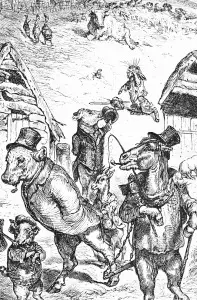A Hare had many good weather friends. When trouble was near they all refused to help the Hare who only barely managed to escape on his own.
He that has many friends, has no friends.

Eliot/Jacobs Version
A Hare was very popular with the other beasts who all claimed to be her friends. But one day she heard the hounds approaching and hoped to escape them by the aid of her many Friends. So, she went to the horse, and asked him to carry her away from the hounds on his back. But he declined, stating that he had important work to do for his master. “He felt sure,” he said, “that all her other friends would come to her assistance.” She then applied to the bull, and hoped that he would repel the hounds with his horns. The bull replied: “I am very sorry, but I have an appointment with a lady; but I feel sure that our friend the goat will do what you want.” The goat, however, feared that his back might do her some harm if he took her upon it. The ram, he felt sure, was the proper friend to apply to. So she went to the ram and told him the case. The ram replied: “Another time, my dear friend. I do not like to interfere on the present occasion, as hounds have been known to eat sheep as well as hares.” The Hare then applied, as a last hope, to the calf, who regretted that he was unable to help her, as he did not like to take the responsibility upon himself, as so many older persons than himself had declined the task. By this time the hounds were quite near, and the Hare took to her heels and luckily escaped.

JBR Collection
Friendship, like love, is but a name,
Unless to one you stint the flame;
The child whom many fathers share
Hath seldom known a father’s care.
‘Tis thus in friendships; who depend
On many, rarely find a friend.
A Hare, who in a civil way
Complied with everything, like Gay,
Was known by all the bestial train
Who haunt the wood and graze the plain;
Her care was never to offend,
And every creature was her friend.
As forth she went at early dawn,
To taste the dew-besprinkled lawn,
Behind she hears the hunter’s cries,
And from the deep-mouthed thunder flies.
She starts, she stops, she pants for breath;
She hears the near advance of death;
She doubles to mislead the hound,
And measures back her mazy round,
Till, fainting in the public way,
Half dead with fear she gasping lay.
What transport in her bosom grew,
When first the Horse appeared in view!
“Let me,” says she, “your back ascend,
And owe my safety to a friend.
You know my feet betray my flight;
To friendship every burden’s light.”
The Horse replied, “Poor honest Puss,
It grieves my heart to sec you thus;
Be comforted, relief is near,
For all your friends are in the rear.”
She next the stately Bull implored;
And thus replied the mighty lord:
“Since every beast alive can tell
That I sincerely wish you well,
I may without offence pretend
To take the freedom of a friend.
Love calls me hence; a fav’rite cow
Expects me near the barley-mow,
And when a lady’s in the case
You know all other things give place.
To leave you thus might seem unkind;
But see, the Goat is just behind.”
The Goat remarked her pulse was high,
Her languid head, her heavy eye.
“My back,” says he, “may do you harm;
The Sheep’s at hand, and wool is warm.”
The Sheep was feeble, and complained
His sides a load of wool sustained:
Said he was slow, confessed his fears;
For hounds cat sheep as well as hares.
She now the trotting Calf addressed,
To save from death a friend distressed.
“Shall I,” says he, “of tender age,
In this important care engage?
Older and abler passed you by–
How strong are those; how weak am I!
Should I presume to bear you hence,
Those friends of mine may take offence.
Excuse me, then; you know my heart,
But dearest friends, alas I must part.
How shall we all lament! Adieu!
For see, the hounds are just in view.”
